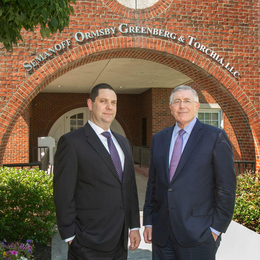
Taking Care of Business
Semanoff Ormsby Greenberg & Torchia’s expanded Trusts and Estates Group helps businesspeople and their families sleep soundly in uncertain times.
The attorneys in the Trusts and Estates Group of Semanoff Ormsby Greenberg & Torchia, LLC (SOGT) see the benefits of preparation play out in real life on a daily basis. Each member of the legal team takes an empathetic approach to helping clients make informed decisions designed to protect their businesses and families.
SOGT, a full-service business law firm, employs a group of attorneys, law specialists, and paralegals devoted to helping clients plan ahead, as well as to meet the changing needs from estate planning to estate and trust administration. Recent months have yielded a significant increase in the demand for SOGT’s expertise in estate planning and related matters. To accommodate this growth, SOGT recently named attorney William J. (“Bill”) Stein as co-chair of the Trusts and Estates Group along with longtime chairperson, Brian R. Price.
Price suggests there is no “one size fits all” when it comes to estate planning. One client’s needs may be straightforward and simple—say, the drafting of essential estate planning documents (a will, a healthcare power of attorney, and a durable power of attorney)—while another may have far more complex needs.
“We do complex very well,” Price says. “The complications often come when you have people with complicated families and family structures, or families with substantial wealth, where the federal estate tax is a big deal. We also see complications in situations involving business owners who have been very successful and want to avoid paying significant taxes that could affect the ongoing success of those businesses.”
Stein often fields calls from the owners of family-run enterprises who come to him for guidance in succession planning, which he says should be factored into any business owner’s estate plan. Essentially, Stein aims to help business owners have intensely personal conversations in the quest to answer fundamental questions such as, “Which direction do you want the company to take?” and “Who do you want to be the driving force of your business after you’re gone?” The answer to the second question may be one person, or it may be a group of people, each with a different skill set critical to the success of the business.
“A succession plan helps to eliminate uncertainty around the future of the business,” Stein says. “On the management side, the death of the owner could leave a big vacuum in the leadership of the company that could negatively affect business operations and employee retention. On the ownership side, the absence of a plan has the potential to create controversy, and you don’t want to create a situation where there could be a fight among family members. A third risk may come from a lack of liquidity, which could result in having to sell the company in less than ideal circumstances.”
Stein realizes such planning requires a fair amount of soul-searching. At the same time, he believes the risks of not planning ahead far outweigh the short-term pain of having a few tough conversations.
“A lot of what we do is guiding clients to engage in those discussions,” he says. “Yes, we’re taking care of the legal work, but there’s a lot of value in the counseling we provide to clients. Doing these things before they’re needed makes it a more collaborative process, and it also tends to make the transition smoother for everyone involved.”
In addition to Price and Stein, the firm’s Trusts and Estates Group includes fellow attorneys Karen F. Angelucci, Mary Jo Baum, Michael B. Dubin, Phyllis Horn Epstein, Alissa B. Gorman, Howard N. Greenberg, and Jocelin A. Price. All are licensed to practice in Pennsylvania, and some have New Jersey bar admissions, which can be helpful in estate settlements for clients with homes or other property in the Garden State.
Alissa Gorman’s areas of practice include estate planning, estate administration, guardianship, and elder law planning, though approximately 30 percent of her caseload involves a special needs component. In regard to the last point, she enjoys working with families to provide protections such as a special needs trust, also known as a supplemental needs trust.
A special needs trust is designed to hold and preserve an inheritance and other financial assets parents wish to leave for their child with special needs. By placing assets in a special needs trust, the child can continue to receive means-tested benefits such as Supplemental Security Income and Medical Assistance, and still have financial assets available to provide for his or her supplemental care.
“Typically, I will meet with the family to get an understanding of the child’s needs,” says Gorman. “I learn how high functioning the child is or isn’t and how much support he or she has or will need when the parents are no longer able to provide the care. … We discuss whether the child will work when he or she gets older and where the child will live. I take this information and develop an estate plan for the family that preserves inheritance monies for the child with special needs.”
Whichever option a family chooses, Gorman will carefully guide parents through the process and help them determine the most appropriate plan for their child’s financial future. She describes the process of working with families of special needs children as “definitely rewarding.”
Phyllis Horn Epstein brings a depth of understanding in matters involving the tax impacts and implications of any transaction a client might consider. As SOGT’s tax counsel, she works closely with her fellow attorneys to help clients avoid any unwanted “surprises” at year’s end, as well as to advise families that would be affected by the federal estate tax.
“There are many [estate planning] vehicles for people to consider—loans to children, revocable and irrevocable trusts, forgiving debt, to name a few—and these kinds of actions all have tax impacts,” she says. “I also do a lot of tax-controversy work and have expertise in dealing with the IRS when there are questions raised about something reported where there’s an audit or collections matter.”
Regardless of the perceived need, Jocelin A. Price says it is important to set aside time now to consider and establish a plan with a trusts and estates attorney who can assist a client during a lifetime, as well as the client’s family after the client’s passing.
“Different estate planning documents control different circumstances,” she says, “so working with an attorney to coordinate the plan can save a client a significant amount of time, money, and frustration in the long run.”
For instance, important lifetime documents such as powers of attorney and advance healthcare directives may alleviate the need for a guardianship proceeding at a later date. Furthermore, taking the time to prepare a will or other relevant documents to address circumstances and distribution of assets after a client’s death may help prevent an intestacy situation. Price suggests it is important to recognize that the statutory distribution may not be consistent with the client’s intended disposition, and that it is essential to review and update estate plans on a regular basis, especially if the client has experienced significant life events.
At SOGT, clients work with a team of professionals to help plan for the future. Julia D. Martin, the practice management coordinator for SOGT’s Trusts and Estates Group, handles new client intake and arranges for specific members of the group to collaborate on the delivery of timely and efficient services to each client. For example, an attorney and a law specialist work together on every estate administration.
“As soon as the estate is opened, we spend a lot of time with clients—helping the surviving spouse and children with all the paperwork, answering questions, guiding them through the process so everything remains on track,” Martin adds. “We do as much for our clients as they want us to do. The family is still grieving after the death of their loved one, so we’re always sensitive to the fact that this isn’t just business.”
Of course, SOGT handles much more than trusts and estates. Other practice areas include structuring new business organizations and transactions, real estate, commercial litigation, employment, intellectual property, and health care, among others. In other words, SOGT has earned a reputation for resolving the many legal issues that tend to keep business owners awake at night.
Semanoff Ormsby Greenberg & Torchia, LLC
(215) 887-0200
sogtlaw.com
2617 Huntingdon Pike
Huntingdon Valley, PA 19006
140 E. Butler Ave.
Chalfont, PA 18914
(215) 887-0200
sogtlaw.com
2617 Huntingdon Pike
Huntingdon Valley, PA 19006
140 E. Butler Ave.
Chalfont, PA 18914
Photo by Ken Lee
Published (and copyrighted) in Suburban Life magazine, July 2022.



